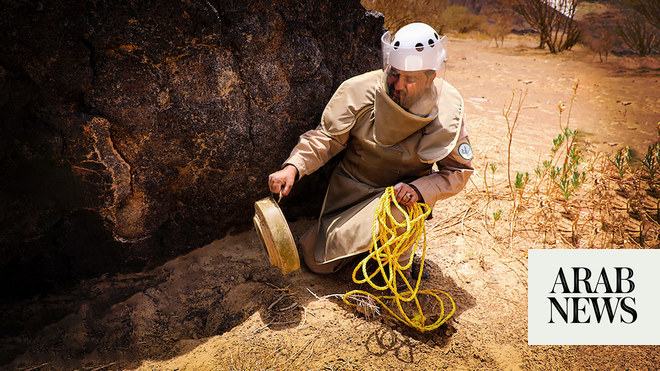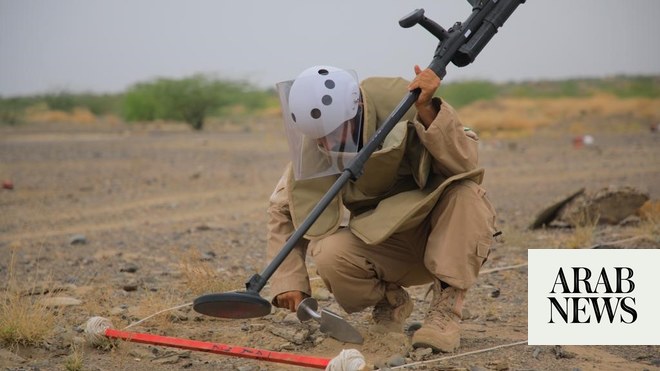
Our reporter accompanied one of the dedicated teams that are part of the Saudi-funded Masam project, which is saving lives in the war-torn country
‘We have lost five world-leading experts and a number of martyrs from Yemen who died performing their mine-clearance work,’ said a leading official
RIYADH: Members of one of the specialist teams that clear landmines from Yemen as part of the Saudi-organized Masam project invited an Arab News crew to accompany them and see how they go about their incredibly dangerous, high-pressure work, which is saving lives in the war-torn country.
“The team starts its work by inspecting all the devices used for removing mines, and ensuring they are functioning perfectly before we begin searching the area,” said one of its members, whose name was not disclosed for reasons of safety and security.
When they are sure all of their equipment is in good working order, they approach the locations where mines are thought to have been planted. On this occasion, three suspected sites have been identified.
The first two turn out to be harmless but at the third, the equipment used to detect dangerous devices immediately emits a loud warning sound, signaling the presence of a mine. Thirty-two other devices have previously been detected in this area.
“Obviously, there is a significant target at this site, because when anti-armor mines are detected, a loud sound emanates from the device,” said the team member.
“We will now deal with this target according to our procedures, since the target has a different sound than the other targets. The signs indicate the presence of an anti-tank mine.”
The team member got down to business immediately, fixing a camera on his helmet to record the disarming process, step by step. As he began, he gave a warning whistle to alert his team leader and other colleagues and warn them that he was dealing with a live mine.
“I will scan and explore the mine and I will deal with it to ensure our safety and my personal safety,” he told Arab News.
“There are tactics adopted by the Houthi militia, including booby-trapping the detonator so that when the person clearing the mine removes the detonator, the device explodes immediately.”
Additional traps can also be placed under a mine that cause an explosion when it is removed, he added. In this way, the Houthis deliberately target the mine-clearing teams.
With this in mind, he carefully attached one end of a long rope to the mine and retreated to a distance of about 100 meters. He then began to shout out a countdown and when it reached zero he pulled hard on the rope. He remained at a safe distance for about 10 minutes to make sure that the mine was safely out of the ground and stable and there was no booby trap under it.
Satisfied that the device was relatively safe to approach, he finally returned to it and carefully removed the detonator. The mine could then be disposed of safely. This operation went of without any problems but that is not always the case.
“We have lost five world-leading experts and a number of martyrs from Yemen who died while performing their mine-clearance work,” said Zawbaa Al-Rawi, Masam’s manager of operations in Aden and the west coast of Yemen.
“This, however, does not hinder the continuation of our work and the full psychological readiness of all individuals.
“The Masam project stands out from the rest of the global landmine projects as it is the only project that does not resort to external funding or require financiers and investors. It is fully financed by Saudi Arabia without resorting to other financing means.”
Al-Rawi said the members of Masam’s teams are all young Yemeni nationals, who willingly put themselves at risk for the good of their country and out of a sense of national pride and respect.
Deon von Landsberg, a training officer with Masam, said: “I work in Yemen on the manual mine-clearance project … and we train all teams on mine clearance.
“At this stage, we have 30 teams in the country and I am currently training another team. Once this is complete, they will be able to remove more mines safely.”
Chris Clark, Masam’s director of special operations, said: “More than 400 Yemenis are deployed and they are trained in International Mine Action Standards and mentored by a team of international technical experts.”












